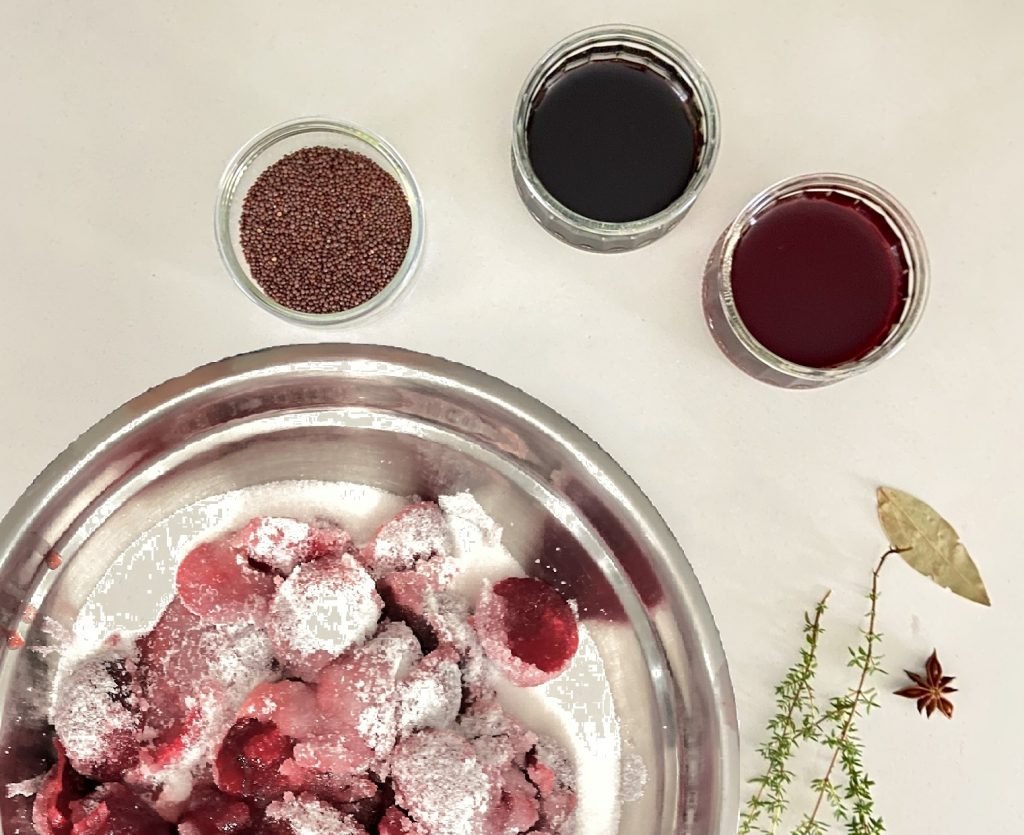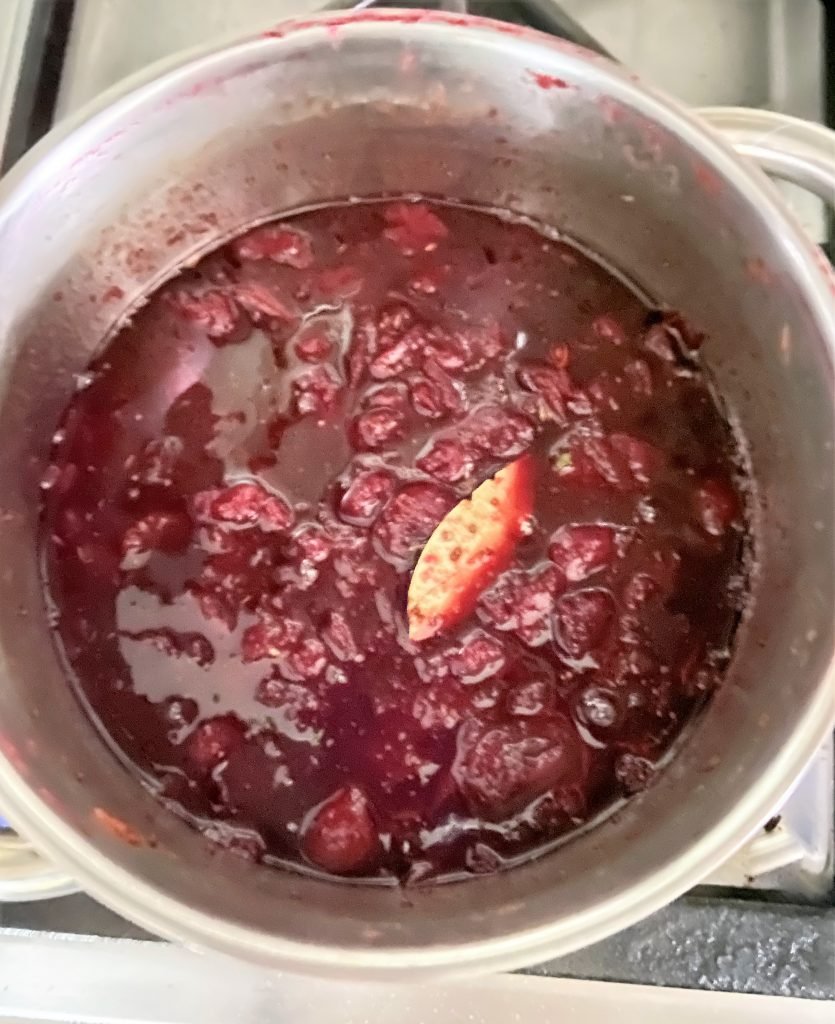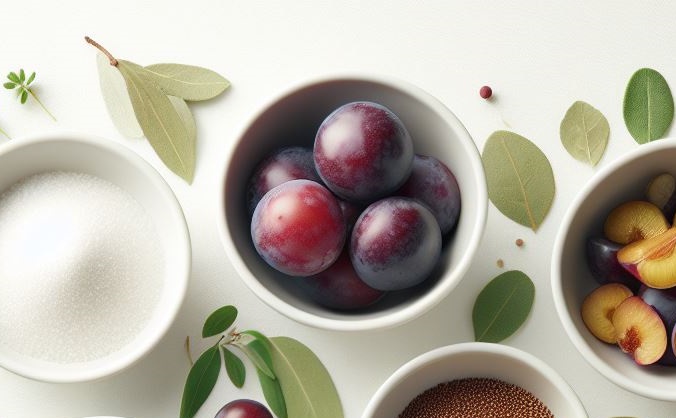Plum Mostarda Recipe: Enjoy Now Or Can For Later
Visits: 28
In the hope that we can replicate our Concord grape mostarda success, we tested several other mostarda recipes. As a result, we came up with this plum mostarda recipe that we are proud to share with you. In brief, our mostarda is a jam-like treat that features plums candied in mustard-infused syrup and spiced with bay leaf, thyme, and star anise. The best part about this mostarda? It is great not only for your immediate enjoyment but you could also preserve a batch for later use.
Plums used in this jam recipe
In order to make this plum mostarda recipe, you can use a variety of plums, but some will be more suitable for this recipe due to their flavor and texture. Unsurprisingly, the best and obvious choice for any Italian plum mostarda recipe is Italian plums, also known as prune plums. Italian plums are small, oval-shaped, and have a sweet-tart flavor. They work well in mostarda recipes because they hold their shape well while cooking and provide a good balance of sweetness and acidity.
However, if you can’t find Italian plums, you can also use other varieties of plums like Santa Rosa plums (our choice for this recipe) or Damson plums, which have a similar flavor profile.


Recommended Equipment
- Wide, heavy-bottomed stainless steel pot
- Large wooden spoon
- Stainless Steel mesh strainer
- Heavy-duty stainless steel kitchen tongs
- Stainless steel pairing knife
- Stainless steel canning ladle
- Stainless steel canning funnel
- Mason Jar lids for canning
- Mason Jars for canning
- Non-slippery trivets and pot holders
- Thick cotton kitchen towel
Plum Mostarda recipe
Equipment
- large pot with a heavy bottom
- wooden spoon or silicone spatula
- potholders, oven mitts, trivets for hot dishes
Ingredients
- 2 ½ lb. plums (1.2 kg)
- 1 bay leaf
- 1 anise pod
- 3 sprigs of thyme
- 5 tbsp. Shiraz red wine
- 1 ½ tbsp. mustard seeds
- 6 tbsp. balsamic vinegar
- ½ cup sugar
Instructions
Preparing the ingredients
- Wash, pit, and chop the plums into large pieces.
- Measure out the rest of the ingredients.
Cooking the plum mostarda
- In a heavy-bottomed wide pot, combine the plums, red wine, balsamic vinegar, sugar, mustard seeds, thyme, bay leaves, star anise pods, and a pinch of salt. Stir to mix the ingredients.
- Allow the plums to macerate overnight to help dissolve the sugar and release their juices.
- Place the saucepan over low heat and bring the mixture to a simmer. Stir occasionally to dissolve the sugar. Do not overmix, as we are trying to keep the fruit getting too mushy.
- Drain the mixture from the plums into a separate sauce pan and bring it to a boil. Allow the liquid to simmer gently for 10 minutes and reduce slightly, take it off the heat and pour it over the plums. Set aside. Repeat this step for 3-4 days
- On the final day reduce the liquid together with the plums until the entire mixture appears syrupy. Use the cold plate test to test for doneness. You want your mostarda to be thick and jam-like. If it's still too runny, continue to simmer while stirring.
- Once the mostarda has reached the desired consistency, remove the thyme sprigs, bay leaves, and star anise pods. Make sure to discard them.
- Your mostarda is ready to be enjoyed now or canned for later use. If canning make sure your mostardo is piping hot as you begin the canning process.
Yield
Choose your preferred canning method to preserve your jam
For those processing this preserve using water bath or steam canner, the processing time guidelines at various altitudes are as follows:
0 – 1,000 ft: 5 mins
1,001 – 6,000 ft: 10 mins
Altitudes Above 6,000 ft: 15 mins
Frequently asked questions
Can I replace sugar with pectin in this plum mostarda recipe?
We use sugar in this recipe to macerate plums. Replacing sugar with pectin won’t let you achieve a desired end result.
How can I increase size of this mostarda batch size?
Increasing the batch size of your plum mostarda recipe is quite straightforward. Basically, you can scale up the ingredients while keeping the proportions the same. Additionally, keep in mind that you’ll also need a larger pot to accommodate the increased quantity of ingredients. Another key point is that the cooking time will be a bit longer due to the larger batch size.
What is mostarda used for?
Traditionally mostarda is used to go alongside cheeses and cold meat cuts on charcuterie boards.
I am not a fan of grainy mustard seeds in mostarda. Can I substitute them with dry mustard in this mostarda recipe?
Firstly, the reason this preserve is called mostarda is because of the mustard-infused syrup used to make it. While the classic recipe calls for mustard seeds, we made our first-ever Concord grape mostarda with powdered mustard. We liked the end result. However, the taste was quite different from what we would have gotten if we had used mustard seeds. In short, yes, you can substitute mustard seeds with dry mustard, but you will end up with a whole new recipe.
What do you eat mostarda with?
- Cheese and Charcuterie Platters: This plum mostarda is a classic accompaniment to cheese and charcuterie boards. It complements the flavors of different cheeses, cured meats, and crackers.
- Roasted or Grilled Meats: This mostarda makes for a wonderful glaze or side condiment for roasted or grilled meats, such as chicken, pork, or lamb. Brush it on during the cooking process or serve it as a condiment.
- Sandwiches and Wraps: Unsurprisingly this mostarda pairs well with various deli meats and vegetables.
- Salads: Mix plum mostarda with a bit of quality olive oil and use it as a dressing over mixed greens or fruit salads to add depth and sweetness to your salad.
- Grilled Cheese: Spread a thin layer of plum mostarda on the inside of your grilled cheese sandwiches to give them a gourmet twist.
- Accompaniment to Poultry: Lastly, we recommend to pair this plum mostarda with turkey. It will make for a lovely addition to a Thanksgiving feast.



